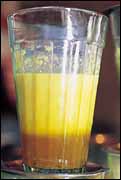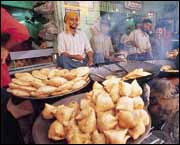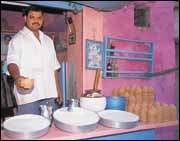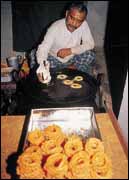


 Street Food Of Banaras
Street Food Of Banaras
For the common man and the pilgrim, Banaras offers an amazing variety of food off the streets. From thandi thandais to luscious lassis, and chat-patta chaats to khaas kachodis, there's a whole new world of food out there. NAYIKA PANDIT reports from the streets. |
|
EATING out in Banaras is no big deal, really. In as little as 25 rupees, it is entirely possible for the backpack tourist or pilgrim on a shoestring budget to depend on the streets for his everyday meals. Hygiene is a little suspect, naturally, because you are talking of eateries that are little more than holes in the wall; or benches and charpais spread around a cauldron of boiling oil and frying pan in which delicious kachodis are frying, and chaats sizzling. The hungry need never starve in Banaras, they will find something to eat at any part of the day or night. Banaras is hospitable, it is economical, and most enterprising.
In Vishwanath Galli, which is the most famous lane in Banaras, jostling for space with the temples and dharamshalas are tiny shops selling the city's best aloo-palak pakoras with hot and sweet chutneys, and the thandaiwallah. These shops are so small and narrow that no customer can step inside. You take your chances standing and eating in the lane, as pilgrims brush past and the occasional bull, which is revered in Varanasi, narrowly misses goring you. You will also come across the papad bhandar where Banarasi businessmen with names like Agrawal and Gupta make and sell papads, after-meal mouth freshners called "mukhwas", pickles and murabbas.
The lassis are thick, creamy and sinful. They are sold in little mud kulhads, five rupees a small kulhad, ten for a big one. When you finish your lassi, the custom is to smash the kulhad on the pavement outside the lassi shop. You do not do this at the sherbetwallahs, because his sherbets come in tall glasses, each one more gaudily fascinating than the next! There are cooling gulkands with crystalised rose petals, a green khus, purple phalsa, mustard sandal sherbet, yellow bel, pale yellow panna, orange kesar, red rose, and a transparent keora. You can have the sherbets also as a gola. Ask the sherbetwallah to grind a handful of ice, roll it into a ball, poke a stick into the ball, and sprinkle your favourite sherbet on this gola. Suck the gola, drain out the sherbet, ask for another flavour next time!
|

Home Page
About the mag
Subscribe
Advertise
Contact Us
 In the narrow, congested gallis leading to the ghats, and in the bustling, polluted market places, there is always somebody making alu tikkiyas, papri chaat and golguppas. Every locality has its own specialist. And the business goes by his name, his shop is not called anything, it often does not even have a number. One galli is more popular than the others for this kind of food and has come to be christened Kachodi Galli. Vendors compete to make Banaras' gourmet item here. The kachodi has many avatars, but is basically a crispy wheat puff flavoured with asafoetida, stuffed with potato, peas and lentils. It is sold in leaf plates accompanied by a dry chickpea preparation called ghugni. Or with a spicy potato curry. Banarasis have the kachodi for breakfast, lunch and dinner.
In the narrow, congested gallis leading to the ghats, and in the bustling, polluted market places, there is always somebody making alu tikkiyas, papri chaat and golguppas. Every locality has its own specialist. And the business goes by his name, his shop is not called anything, it often does not even have a number. One galli is more popular than the others for this kind of food and has come to be christened Kachodi Galli. Vendors compete to make Banaras' gourmet item here. The kachodi has many avatars, but is basically a crispy wheat puff flavoured with asafoetida, stuffed with potato, peas and lentils. It is sold in leaf plates accompanied by a dry chickpea preparation called ghugni. Or with a spicy potato curry. Banarasis have the kachodi for breakfast, lunch and dinner.
 Banarasis have a passion for milk-based drinks. The lassi is one, sherbets in all colours and flavours are another, but the thandai is the speciality. It is a cooling drink made of purified water, sugar, seeds of watermelon and muskmelon, almonds, lotus stem seeds, cashewnut, cardmom, saunf, rose-flower, white pepper, saffron and bhang. Bhang is the intoxicant! It is made from a leaf that grows wildly in Uttar Pradesh and Bihar, like opium and marijuana, but which farmers need a government licence to cultivate and sell. A spoon of bhang in the thandai makes a world of a difference. Bhang is mixed with milk, ice and cream, and added to the thandai to produce a kick! It can make you sing, it can make you dance, bhang can drive you deliriously happy or as depressed as hell. Lace your thandai with it cautiously.
Banarasis have a passion for milk-based drinks. The lassi is one, sherbets in all colours and flavours are another, but the thandai is the speciality. It is a cooling drink made of purified water, sugar, seeds of watermelon and muskmelon, almonds, lotus stem seeds, cashewnut, cardmom, saunf, rose-flower, white pepper, saffron and bhang. Bhang is the intoxicant! It is made from a leaf that grows wildly in Uttar Pradesh and Bihar, like opium and marijuana, but which farmers need a government licence to cultivate and sell. A spoon of bhang in the thandai makes a world of a difference. Bhang is mixed with milk, ice and cream, and added to the thandai to produce a kick! It can make you sing, it can make you dance, bhang can drive you deliriously happy or as depressed as hell. Lace your thandai with it cautiously.
 Other delectable snacks you can eat off the streets are the potato chaat garnished with green coriander, ghee, yoghurt and sugar syrup; the spinach and besan pakora; the potato and peas samosa with chutney; dalmoth, chura, papad, and the sweet and sour masala flavoured kanji to wash it all down. There are also sweets, hot, crisp jelebis dripping syrup, rabri, barfi, chumchum, malaipaan, ladoos, rasogullas.
Other delectable snacks you can eat off the streets are the potato chaat garnished with green coriander, ghee, yoghurt and sugar syrup; the spinach and besan pakora; the potato and peas samosa with chutney; dalmoth, chura, papad, and the sweet and sour masala flavoured kanji to wash it all down. There are also sweets, hot, crisp jelebis dripping syrup, rabri, barfi, chumchum, malaipaan, ladoos, rasogullas.